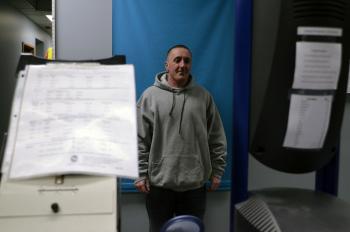Working Together, NDCS and the DMV are Making Communities Safer
Working Together, NDCS and the DMV are Making Communities Safer
FOR IMMEDIATE RELEASE (18-02)
CONTACT Dawn-Renee Smith, Communications Director, Nebraska Department of Correctional Services
OFFICE 402-479-5713 | dawnrenee.smith@nebraska.gov
CONTACT Rhonda Lahm, Director, Nebraska Department of Motor Vehicles
OFFICE 402-471-3900 | rhonda.lahm@nebraska.gov
Jan. 4, 2018 (Lincoln, Neb.) – Today, Rhonda Lahm, director of the Nebraska Department of Motor Vehicles (DMV), and Scott R. Frakes, director of the Nebraska Department of Correctional Services (NDCS), applauded their teams for a collaboration that will make Nebraska’s communities safer.
It is almost impossible to function in society without government-issued identification (ID), said Grace Sankey-Berman, NDCS reentry administrator. “Providing the opportunity to obtain that ID before people discharge is one less thing they have to worry about and brings them one step closer to getting a job and establishing stability.”
Legislative Bill 258 (2017) sought to ensure individuals leaving prison had the opportunity to obtain ID prior to discharge. One of the barriers to obtaining ID prior to release was the proof of residency requirements, which were especially difficult for individuals leaving prison. Directors Lahm and Frakes charged their teams with finding a solution.
“Creating greater effectiveness and efficiencies is a priority within our agencies,” said Director Lahm. “As Director Frakes and I discussed the issue, we knew our agencies could develop a process that would meet the intent of the legislation and increase opportunities for successful reentry.”
The NDCS team members and DMV administrators developed a process and then turned it over to the team at the Community Corrections Center – Lincoln (CCC-L) to operationalize it for the work release population. The pilot initiative was spearheaded by the assistant warden and two case managers at CCC-L.
They started with six incarcerated individuals obtaining their IDs in October. In November, the number rose to 11 and by December they needed a bus to transport 31 incarcerated individuals from CCC-L to the DMV.
“It’s a great partnership,” said Sara O’Rourke, DMV driver’s license administrator. “The DMV is happy to assist these individuals in obtaining State ID cards so that reentry is easier and they can be employed sooner.”
To make the process run smoothly, CCC-L sends the DMV necessary documents, such as birth certificates, forms of address and forms of identification, ahead of time. This way, everything is ready for individuals when they walk in the door. After filling out a short form, answering a few questions and snapping a picture, individuals leave the DMV with a temporary paper copy of their state ID or driver’s license. The DMV then mails the permanent plastic IDs to CCC-L.
“Having identification upon release is one less thing to worry about and one less thing to have to pay for later on,” CCC-L Assistant Warden Settles said. “If you take care of it while you’re at the facility, it assists you in getting started upon release.”
In addition to removing the barriers, NDCS now requires everyone to have an ID before they can promote from supervised work detail to work release, which offers greater freedom and responsibility.
“This is the kind of collaboration that enhances public safety,” said Director Frakes. “Finding employment and obtaining safe, suitable housing leads to greater success and lower recidivism.”
Individuals pay for their own identification. If they cannot afford it, the Matt Talbott Kitchen has resources available to assist them.
“Right now, it’s helping me get a job,” said Nina Krupka, who has been incarcerated for almost eight years and obtained her state ID card with the group of 31 incarcerated individuals in December.
To help the process continue moving smoothly in the future, individuals have the opportunity to begin the process of obtaining those required documents at intake so that when they transition to a community center, they are ready to get their IDs and move on to work release.
Moving forward, CCC-L Assistant Warden Settles hopes to see 80 percent of individuals at CCC-L with identification by July. He knows this is an ambitious goal, given the relatively short time period people spend in community corrections centers as opposed to more permanent facilities, but believes it is possible.
Much of this possibility is thanks to the DMV’s earnest efforts, Settles explained. He described the process as efficient and effective, noting the DMV is incredibly well-organized. During CCC-L’s last visit, they averaged just over one minute per person – getting 31 state IDs and driver’s licenses issued in 35 minutes.
“They have been excellent to work with,” Settles said. “They have made every accommodation they can to get this process going. The DMV team is professional, cooperative and great problem solvers at all levels.”
CCC-L has DMV trips planned monthly and leaders at the Community Corrections Center-Omaha (CCC-O) also have plans to implement the process to start transporting incarcerated individuals to the DMV in Omaha in the coming months.
###

